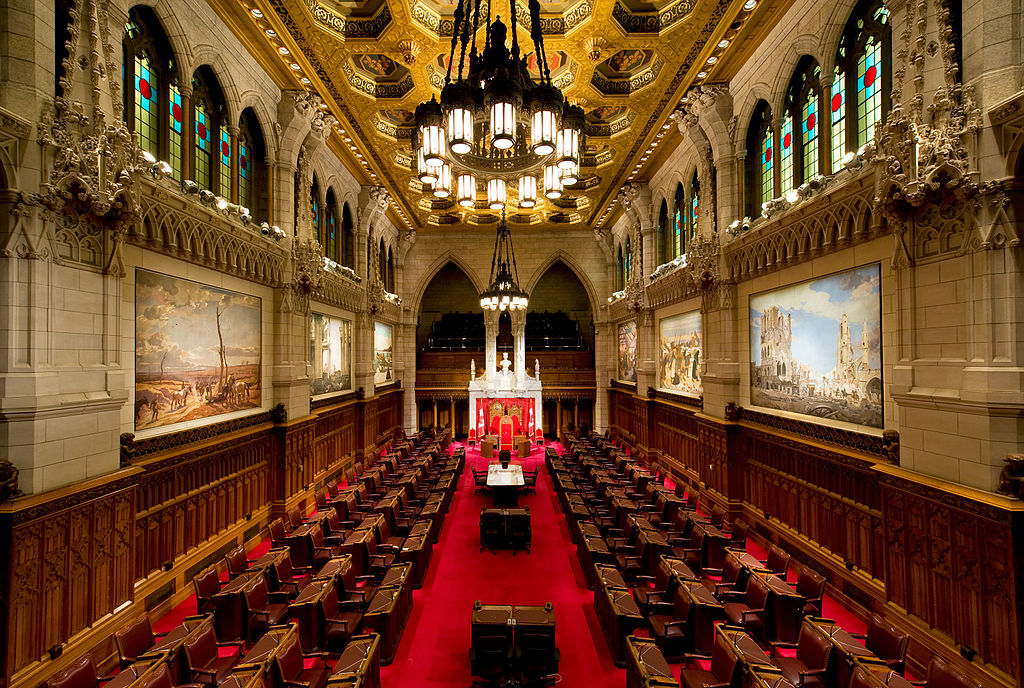
REGINA — Prime Minister Stephen Harper announced Friday a moratorium on Senate appointments — formalizing his practice over the past two and a half years of refusing to fill vacancies in the scandal-plagued upper house.
Harper said the moratorium will save taxpayers’ money and “force” the provinces to come up with a plan to reform or abolish the discredited, unelected, upper chamber.
“The government is not going to take any actions going forward that would do anything to further entrench that unelected, unaccountable Senate,” he said Friday at a news conference in Regina alongside Saskatchewan Premier Brad Wall, a champion of Senate abolition.
“It will be our policy to formalize that. We will have a moratorium on further Senate appointments.”
But the prime minister’s ploy is constitutionally debatable.
Vancouver lawyer Aniz Alani has already gone to court seeking a declaration that Harper has a constitutional duty to fill Senate vacancies within a reasonable time. And constitutional experts have warned that one or more provinces could also take Harper to court over his failure to ensure they have the Senate representation to which they are constitutionally entitled.
Moreover, the Supreme Court of Canada has made it clear that letting Senate vacancies pile up can not continue indefinitely. In a landmark ruling last year, the top court said the Senate cannot be abolished indirectly by letting its numbers drop to zero.
However, Harper asserted Friday that the Constitution gives the prime minister “the authority to appoint or not appoint” senators.
He stopped appointing senators in March 2013, just as the scandal over improperly claimed expenses was engulfing the Senate. There are now 22 vacancies in the 105-seat chamber — a development Harper said has already saved taxpayers $6 million.
One quarter of Quebec’s 24 Senate seats are now empty, as are seven of Ontario’s 24 and half of Manitoba’s six.
Letting the vacancies continue to mount “will force the provinces… to either come up with a plan of comprehensive reform or to conclude that the only way to deal with the status quo is abolition,” Harper said, adding that he expects public pressure will mount on the provinces to act.
“The ball’s in their court, they can now propose reforms. In the meantime, the membership in the Senate is going to continue to shrink and Canadians are going to ask the question, ‘If you don’t have a program for reform and we’re not missing the senators, why not just abolish it?’ And I think that’s the pressure that’s going to rise.”
Other than senators and those who want to be senators, Harper asserted that “no one is going to complain” about increasing vacancies.
He attached a caveat to his moratorium on appointments, however: it will apply only as long as the Conservatives have the numbers in the Senate to ensure passage of his government’s legislation, which Harper said “should not be a problem for several years.”
In its ruling last year, the Supreme Court said reforming the Senate requires a constitutional amendment approved by seven provinces with at least 50 per cent of the population. It put the bar even higher for abolition: unanimous provincial consent.
Quebec Premier Philippe Couillard last month said his province will never agree to abolition. Ontario’s Kathleen Wynne is also opposed, as are Atlantic premiers.
Quebec’s intergovernmental affairs minister, Jean-Marc Fournier, said Friday that his province is willing to take part in any constitutional negotiations on Senate reform but he repeated that it would insist on including other long-standing constitutional issues, such as recognition of Quebec’s distinctiveness.
“Refusing to name new senators is not a solution to the current situation,” Fournier said in a statement.
Wynne’s office released a statement indicating that constitutional wrangling over the Senate is not high on her list of priorities.
“Today’s announcement distracts from the urgent priorities facing Canadians, like infrastructure investments and retirement security,” the statement said.
Wall fully supported the prime minister’s move.
“It will be up to premiers… to respond to this now,” he said.
Liberal Leader Justin Trudeau, doing some pre-election campaigning in Vancouver, said Harper is trying to deflect attention from his sorry economic record. He also said that Harper promised during the 2006 election campaign not to appoint any unelected senators and has since appointed 59 of them.
“The fact is we can’t believe him on that.”
Trudeau said he’s the only leader who’s come up with a practical plan to restore the Senate to its intended role as an independent chamber of sober second thought — without fruitless constitutional haggling. He’s kicked senators out of the Liberal caucus and promised to create a blue chip advisory body to recommend non-partisan Senate nominees in future.
NDP Leader Tom Mulcair has promised to launch constitutional negotiations to abolish the Senate.
With files from Joan Bryden in Ottawa